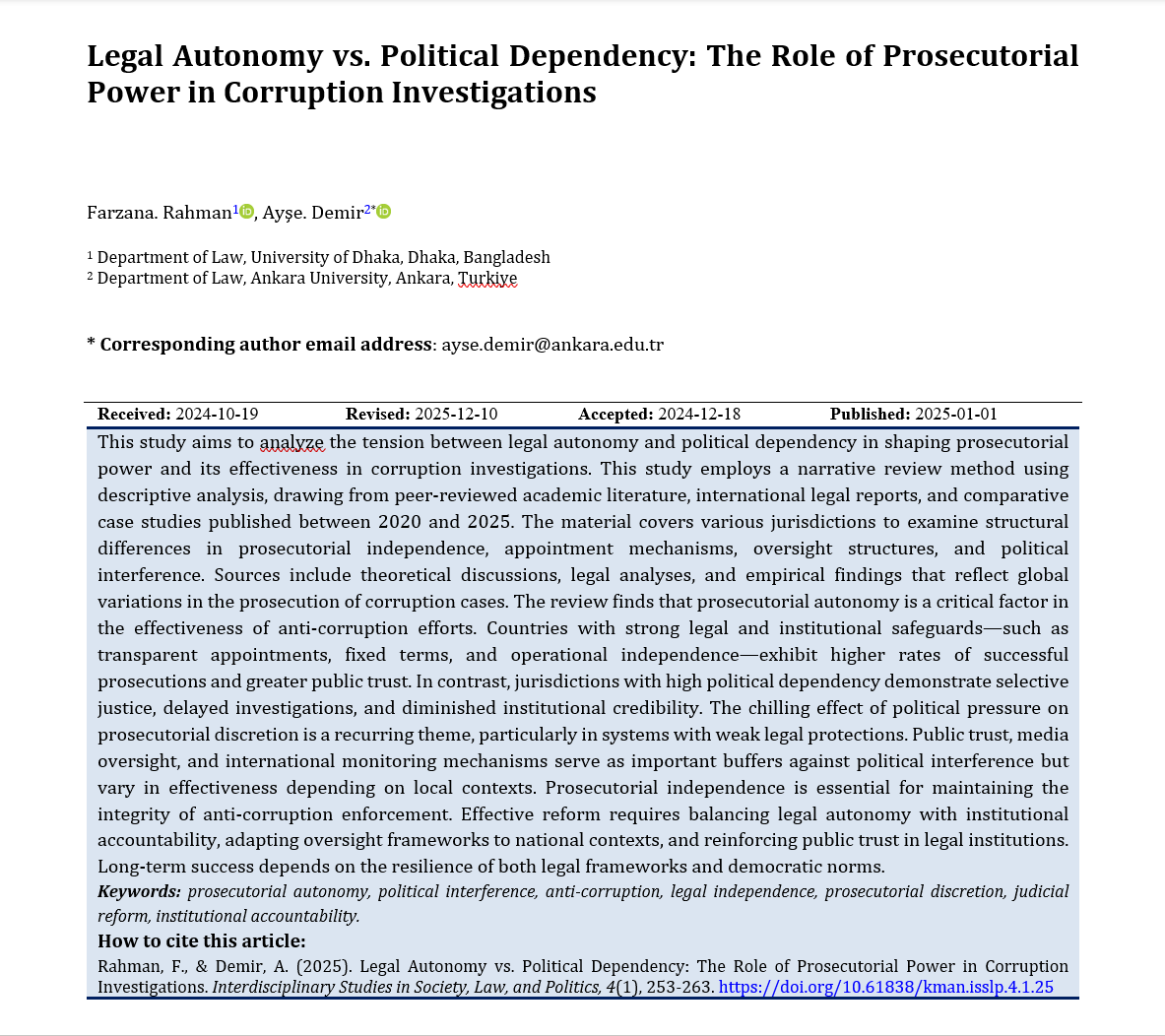Legal Autonomy vs. Political Dependency: The Role of Prosecutorial Power in Corruption Investigations
Keywords:
prosecutorial autonomy, political interference, anti-corruption, legal independence, prosecutorial discretion, judicial reform, institutional accountabilityAbstract
This study aims to analyze the tension between legal autonomy and political dependency in shaping prosecutorial power and its effectiveness in corruption investigations. This study employs a narrative review method using descriptive analysis, drawing from peer-reviewed academic literature, international legal reports, and comparative case studies published between 2020 and 2025. The material covers various jurisdictions to examine structural differences in prosecutorial independence, appointment mechanisms, oversight structures, and political interference. Sources include theoretical discussions, legal analyses, and empirical findings that reflect global variations in the prosecution of corruption cases. The review finds that prosecutorial autonomy is a critical factor in the effectiveness of anti-corruption efforts. Countries with strong legal and institutional safeguards—such as transparent appointments, fixed terms, and operational independence—exhibit higher rates of successful prosecutions and greater public trust. In contrast, jurisdictions with high political dependency demonstrate selective justice, delayed investigations, and diminished institutional credibility. The chilling effect of political pressure on prosecutorial discretion is a recurring theme, particularly in systems with weak legal protections. Public trust, media oversight, and international monitoring mechanisms serve as important buffers against political interference but vary in effectiveness depending on local contexts. Prosecutorial independence is essential for maintaining the integrity of anti-corruption enforcement. Effective reform requires balancing legal autonomy with institutional accountability, adapting oversight frameworks to national contexts, and reinforcing public trust in legal institutions. Long-term success depends on the resilience of both legal frameworks and democratic norms.
Downloads
References
Arriagada, I., Saux, M. G. L., Wilenmann, J., & ÁGuila, F. (2023). ‘No, Buddy, I Will Not Speak to the Press – I Am Working!’: Criminal Justice and the Interprofessional Dynamics of Communication Production in the Chilean Public Prosecutorial Office. Journal of Law and Society, 50(2), 185-207. https://doi.org/10.1111/jols.12424
Barno, M., & Lynch, M. (2021). Selecting Charges. 35-58. https://doi.org/10.1093/oxfordhb/9780190905422.013.3
Berryessa, C. M., Dror, I. E., & McCormack, C. J. B. (2022). Prosecuting From the Bench? Examining Sources Ofpro‐prosecutionbias in Judges. Legal and Criminological Psychology, 28(1), 1-14. https://doi.org/10.1111/lcrp.12226
Brutyan, A. (2023). The Issues of Prosecutorial Supervision Over the Legality of the Application of Imprisonment. 160-181. https://doi.org/10.59821/18294219-2023.2-abad07
Crummett, D. (2020). Prosecutorial Discretion and Republican Non-Domination. Ethical Theory and Moral Practice, 23(5), 965-985. https://doi.org/10.1007/s10677-020-10122-y
Ejaz, Z. A., Mushtaq, S. A., Rakha, A., & Shahab, S. (2024). The Evolving Role of Prosecution in Pakistan's Criminal Justice System: A Comparative Analysis With India. CRSSS, 2(2), 210-229. https://doi.org/10.59075/vn9bnc26
Getsko, V. V. (2025). Models of the Prosecutor’s Office in the Mechanism of Distribution of State Power: Experience of Foreign Countries. Uzhhorod National University Herald Series Law, 4(87), 386-391. https://doi.org/10.24144/2307-3322.2025.87.4.60
Imankulov, T. (2023). Changing the Constitutional and Legal Status of the Prosecutor’s Office as Evidence of the Constitutional Crisis and the Victory of Organized Crime in the Kyrgyz Republic in 2023. Bulletin of Science and Practice(9), 212-228. https://doi.org/10.33619/2414-2948/94/23
Inshakova, A. O. (2022). The Russian Prosecutor’s Office as a Bulwark of Law and Order. Legal Concept(2), 6-10. https://doi.org/10.15688/lc.jvolsu.2022.2.1
Kakitelashvili, M. M. (2022). Conceptual Approaches to the Organization of Prosecutorial Activities in the Fight Against Global Corruption. Russian Journal of Legal Studies (Moscow), 9(1), 73-84. https://doi.org/10.17816/rjls100496
Khotynska-Nor, O. (2024). The Model of Prosecutorial Self-Governance in Ukraine and the Baltic Countries: A Comparative Aspect. Access to Justice in Eastern Europe, 7(2), 393-409. https://doi.org/10.33327/ajee-18-7.2-a000201
Lee, K. O. (2022). A Critical Review on the Case That Has Acknowledged Abuse of Prosecutorial Right. The Korean Association of Criminal Procedure Law, 14(2), 167-192. https://doi.org/10.34222/kdps.2022.14.2.167
Mou, Y. (2022). Accountable for a Lifetime: Reforms in Prosecutorial Accountability in China. China Law and Society Review, 6(1), 36-78. https://doi.org/10.1163/25427466-07010003
Mykhailiuk, S. S. (2025). Principles of Prosecutorial Self-Government in Ukraine. Uzhhorod National University Herald Series Law, 5(86), 187-193. https://doi.org/10.24144/2307-3322.2024.86.5.28
Pavlenko, D. (2023). Foreign Experience in the Regulating of Administrative Legal Functions of the Prosecution Service. VJHR(5), 66-74. https://doi.org/10.61345/1339-7915.2023.5.9
Shishkin, S. I., & Ogorodov, A. N. (2023). Ogorodov A. N. On the Question of the Place of the Prosecutor's Office in the System of Public Authorities of the Russian Federation. Siberian Law Herald, 4, 36-41. https://doi.org/10.26516/2071-8136.2023.4.36
Suwartono, S., & Efendi, J. (2024). Reformulation of the Duties and Authorities of the Prosecutor’s Commission in Indonesian Legislation. Journal of Multidisciplinary Research, 40-49. https://doi.org/10.56943/jmr.v3i1.624
Usov, A. Y. (2023). Prosecutor's Science: Current State and Development Trends. Nb Административное Право И Практика Администрирования(4), 1-8. https://doi.org/10.7256/2306-9945.2023.4.44189
Voronin, O. V. (2021). On the Modern Understanding of the Concepts of «legal Remedies of Prosecutorial Supervision» and «forms of Implementation of Legal Remedies of Prosecutorial Supervision». Vestnik Tomskogo Gosudarstvennogo Universiteta Pravo(39), 5-14. https://doi.org/10.17223/22253513/39/1

Downloads
Additional Files
Published
Submitted
Revised
Accepted
Issue
Section
License

This work is licensed under a Creative Commons Attribution-NonCommercial 4.0 International License.





